Related Research Articles
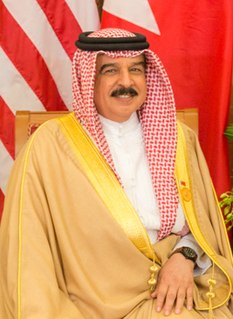
Hamad bin Isa bin Salman Al Khalifa (Arabic: حمد بن عيسى بن سلمان آل خليفة Ḥamad bin ʿĪsā bin Salmān ʾĀl Ḫalīfah; is King of Bahrain since 14 February 2002, after ruling as Emir of Bahrain from 6 March 1999. He is the son of Isa bin Salman Al Khalifa, the previous and first emir. The country has been ruled by the Al Khalifa dynasty since 1783.
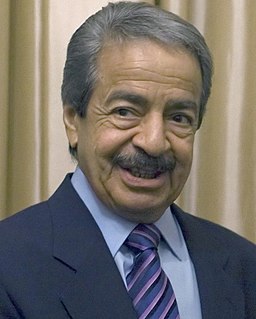
Prince Khalifa bin Salman Al Khalifa was a Bahraini royal and politician who had served as the Prime Minister of Bahrain from 10 January 1970 until his death on 11 November 2020, having taken office over a year before Bahrain's independence on 15 August 1971.

Prince Salman bin Hamad bin Isa Al Khalifa, Deputy King, Crown Prince of Bahrain is the heir apparent and the Prime Minister of the Kingdom of Bahrain. He is also the deputy supreme commander of the Bahrain Defense Force.

Sheikha Moza bint Nasser is the consort of Sheikh Hamad bin Khalifa Al Thani, former Emir of the State of Qatar. Sheikha Moza is co-founder and chairperson of the Qatar Foundation.
Technological literacy is the ability to use, manage, understand, and assess technology. Technological literacy is related to digital literacy in that when an individual is proficient in using computers and other digital devices to access the Internet, digital literacy gives them the ability to use the Internet to discover, review, evaluate, create, and use information via various digital platforms, such as web browsers, databases, online journals, magazines, newspapers, blogs, and social media sites.
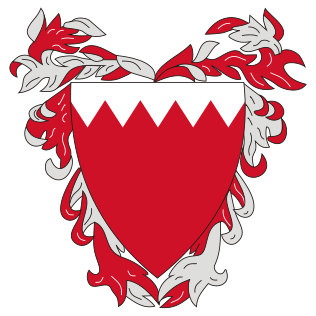
In Bahrain, the Prime Minister is the head of government of the country. According to the Constitution of Bahrain, the Prime Minister is appointed directly by the King, and needs not be an elected member of the Council of Representatives.

Salman bin Hamad Al Khalifa, was the ruler of Bahrain from 1942 until his death in 1961. His title was Hakim of Bahrain. He was succeeded by his son Isa bin Salman Al Khalifa in December 1961.

Hamad ibn Isa Al Khalifa KCIE, CSI was the ruler of Bahrain from 1932 until his death in 1942. His title was Hakim of Bahrain.
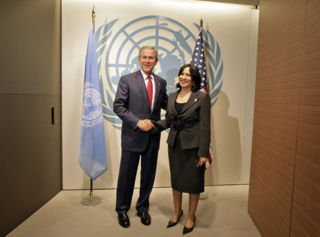
Haya Rashed Al-Khalifa is a pioneering lawyer and diplomat from Bahrain. As ambassador to France 1999-2004 she became Bahrain's first ever female ambassador. She is one of the first women to practice law in Bahrain, and the third ever woman to preside at the UN General Assembly.
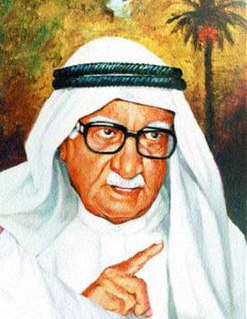
Ebrahim Al-Arrayedh was a Bahraini writer and poet, generally considered to be one of Bahrain's greatest poets and one of the leaders of the Bahraini literary movement in the 20th century.
Succession to the Bahraini throne is determined by agnatic primogeniture amongst the male descendants of King Hamad bin Isa Al Khalifah. However, the ruling King of Bahrain has the right to appoint any of his other sons as his successor according to article 1 of the Constitution of Bahrain.
Claroline is a collaborative eLearning and eWorking platform released under the GPL open-source license. It allows hundreds of organizations worldwide ranging from universities to schools and from companies to associations to create and administer courses and collaboration spaces over the web. The platform is used in more than 100 countries and is available in 35 languages.
Education For All (EFA) is a global movement led by UNESCO, aiming to meet the learning needs of all children, youth and adults by 2015.

The United Nations Educational, Scientific and Cultural Organization is a specialised agency of the United Nations (UN) aimed at promoting world peace and security through international cooperation in education, the sciences, and culture. It has 193 member states and 11 associate members, as well as partners in the nongovernmental, intergovernmental, and private sector. Headquartered in Paris, France, UNESCO has 53 regional field offices and 199 national commissions that facilitate its global mandate.

Reach Out To Asia(ROTA) is a Qatari-based non-profit organisation that provides access to primary and secondary education to children affected by crisis across Asia. It was launched in December 2005 under the patronage of Crown Prince Sheikh Tamim bin Hamad bin Khalifa Al- Thani and chaired by Sheikha Al-Mayassa bint Hamad bin Khalifa Al-Thani.
The first inscriptions on UNESCO's Memory of the World Register were made in 1997. By creating a compendium of the world’s documentary heritage, including manuscripts, oral traditions, audio-visual materials, library and archive holdings, the program aims to promote the exchange of information among experts and raise resources for the preservation, digitization, and dissemination of documentary materials. As of December 2018, 429 main documentary heritages had been inscribed in the Register, with 116 of these from Asia and the Pacific.
Bahrain Polytechnic is a government-owned tertiary education institute located in the Kingdom of Bahrain. It has been established by King Hamad bin Isa Al Khalifa; King of Bahrain by Royal Decree in July 2008. It is considered a key initiative for the Education and Training Development Committee; a project of the Bahrain Vision 2030 master plan. Bahrain Polytechnic delivers applied learning, technical education, skills-based and occupational training. Degrees offered range from certificate courses, diplomas, to bachelor's degree levels.
Mohamed Bin Issa Al Jaber is an Arab businessman and philanthropist. He is known for hotel and resort investments through the MBI Group, and for his philanthropy through the MBI Al Jaber Foundation, based in London. He lives in Paris, London, Vienna and Jeddah.
ALISON is a free online education platform that mostly focuses on workplace-based skills. It was founded in Galway, Ireland by Irish social entrepreneur Mike Feerick on 21 April 2007.
References
- ↑ "UNESCO King Hamad Bin Isa Al Khalifa Prize for the Use of ICTs in Education | United Nations Educational, Scientific and Cultural Organization". www.unesco.org. Retrieved 2019-03-26.
- 1 2 Bullough, Joseph (2019-02-27). "Winners from Finland and the Netherlands to receive UNESCO King Hamad Bin Isa Al-Khalifa Prize on ICT Innovation in Education". Flexible Learning Strategies – Education Innovation Lab for Out of School Children. Retrieved 2019-03-26.
- 1 2 "German and Korean internet education initiatives win UNESCO prize". UN News. 2012-11-12. Retrieved 2019-03-26.
- 1 2 "NTU wins two UNESCO awards for innovation in education". news.ntu.edu.sg. Retrieved 2019-03-26.
- ↑ "ICT in Education Prize". UNESCO. 2017-11-07. Retrieved 2019-03-26.
- ↑ "2018 Eligibility Criteria and Nomination Process 'The use of innovative ICT to ensure education for the most vulnerable groups'" (PDF).
- ↑ "Laureates from Brazil and Spain to receive UNESCO King Hamad Bin Isa Al-Khalifa Prize for their use of AI in education".
- ↑ "Laureates from Brazil and Spain to receive UNESCO King Hamad Bin Isa Al-Khalifa Prize for their use of AI in education".
- ↑ "Good news Finland".
- ↑ Netherl, Bradutch Brazilian Chamber of Commerce in the; s (2019-03-11). "Dutch project to receive UNESCO Prize on Innovation in Education". BRADUTCH. Retrieved 2019-03-26.
- ↑ "CLIx project receives UNESCO award". MIT News. Retrieved 2019-03-26.
- ↑ "Moroccan Project Wins UNESCO King Hamad Bin Isa Al-Khalifa Prize". The North Africa Post. 2018-03-03. Retrieved 2019-03-26.
- ↑ "Kiron".
- ↑ "Une plate-forme par l'UNESCO synonyme d'éducation, d'intégration et d'espoir pour les réfugiés | Organisation des Nations Unies pour l'éducation, la science et la culture". www.unesco.org. Retrieved 2019-03-26.
- ↑ "Unesco awards Jaago Foundation for innovation in education". Dhaka Tribune. 2017-02-21. Retrieved 2019-03-26.
- ↑ "NGOs from Bangladesh and Germany receive UNESCO King Hamad Bin Isa Al-Khalifa Prize for Innovation in Education". UNESCO. 2017-02-15. Retrieved 2019-03-26.
- ↑ "ICT in Education Prize Honours Projects from Costa Rica and Singapore". UNESCO. 2016-01-18. Retrieved 2019-03-26.
- ↑ "Open Source Physics @ Singapore project of the Ministry of Education of the Republic of Singapore". UNESCO. 2016-01-18. Retrieved 2021-03-20.
- ↑ "2011 UNESCO King Hamad Bin Isa Al-Khalifa Prize for Use of ICT in Education rewards projects from Germany and Republic of Korea". UNESCO. 2014-11-28. Retrieved 2019-03-26.
- ↑ "Serious Games Conference 2014: ISSSG2014 & SGC2014". rpsonline.com.sg. Retrieved 2019-03-26.
- ↑ ""The 'E' in e-learning really can stand for exciting!" | United Nations Educational, Scientific and Cultural Organization". www.unesco.org. Retrieved 2019-03-26.
- ↑ "All Events | United Nations Educational, Scientific and Cultural Organization". www.unesco.org. Retrieved 2019-03-26.
- ↑ International, Education. "British and Venezuelan educators win UNESCO technology prize". Education International. Retrieved 2019-03-26.
- ↑ "Connecting the disconnected: UK and Venezuelan ICT experts awarded UNESCO King Hamad bin Isa Al Khalifa Prize | United Nations Educational, Scientific and Cultural Organization". www.unesco.org. Retrieved 2019-03-26.
- ↑ "Российский ученый Алексей Семенов награжден престижной премией ЮНЕСКО". РИА Новости (in Russian). 2009-11-30. Retrieved 2019-03-26.
- ↑ "Dr. Alexei Semenov". www.wise-qatar.org. Retrieved 2019-03-26.
- ↑ "JEI wins UNESCO Prize | United Nations Educational, Scientific and Cultural Organization". www.unesco.org. Retrieved 2019-03-26.
- ↑ "Interview with Haif Bannayan, Chief Executive Officer of the Jordan Education Initiative | United Nations Educational, Scientific and Cultural Organization". www.unesco.org. Retrieved 2019-03-26.
- ↑ "2009 UNESCO King Hamad Bin Isa Al-Khalifa Prize for the Use of ICTs in Education awarded | United Nations Educational, Scientific and Cultural Organization". www.unesco.org. Retrieved 2019-03-26.
- ↑ "Winners of UN prize for use of technology in education unveiled". UN News. 2009-11-27. Retrieved 2019-03-26.
- ↑ "Hoda Baraka". World Economic Forum. Retrieved 2019-03-26.
- ↑ "Chinese and Egyptian laureates to receive UNESCO prize for the use of ICT in Education | United Nations Educational, Scientific and Cultural Organization". www.unesco.org. Retrieved 2019-03-26.
- ↑ "Belgium and U.S.A.-based projects to receive 2007 UNESCO King Hamad Bin Isa Al-Khalifa Prize | United Nations Educational, Scientific and Cultural Organization". www.unesco.org. Retrieved 2019-03-26.
- ↑ "UNESCO honours projects in Belgium and US for using ICT to enhance learning". UN News. 2007-10-01. Retrieved 2019-03-26.
- ↑ "International recognition to Finnish education arrangement, a prize to Kemi-Tornio Polytechnic". finoecd.org. Retrieved 2019-03-26.
- ↑ "UNESCO announces laureates of ICTs in education prize | United Nations Educational, Scientific and Cultural Organization". www.unesco.org. Retrieved 2019-03-26.
- ↑ "UNESCO KING HAMAD BIN ISA AL-KHALIFA PRIZE FOR THE USE OF ICTS IN EDUCATION - INSIGHTS INTO THE PROJECTS FROM 2006 TO 2011" (PDF).
- ↑ "Previous laureates of the ICT in Education Prize". UNESCO. 2017-11-07. Retrieved 2019-03-26.